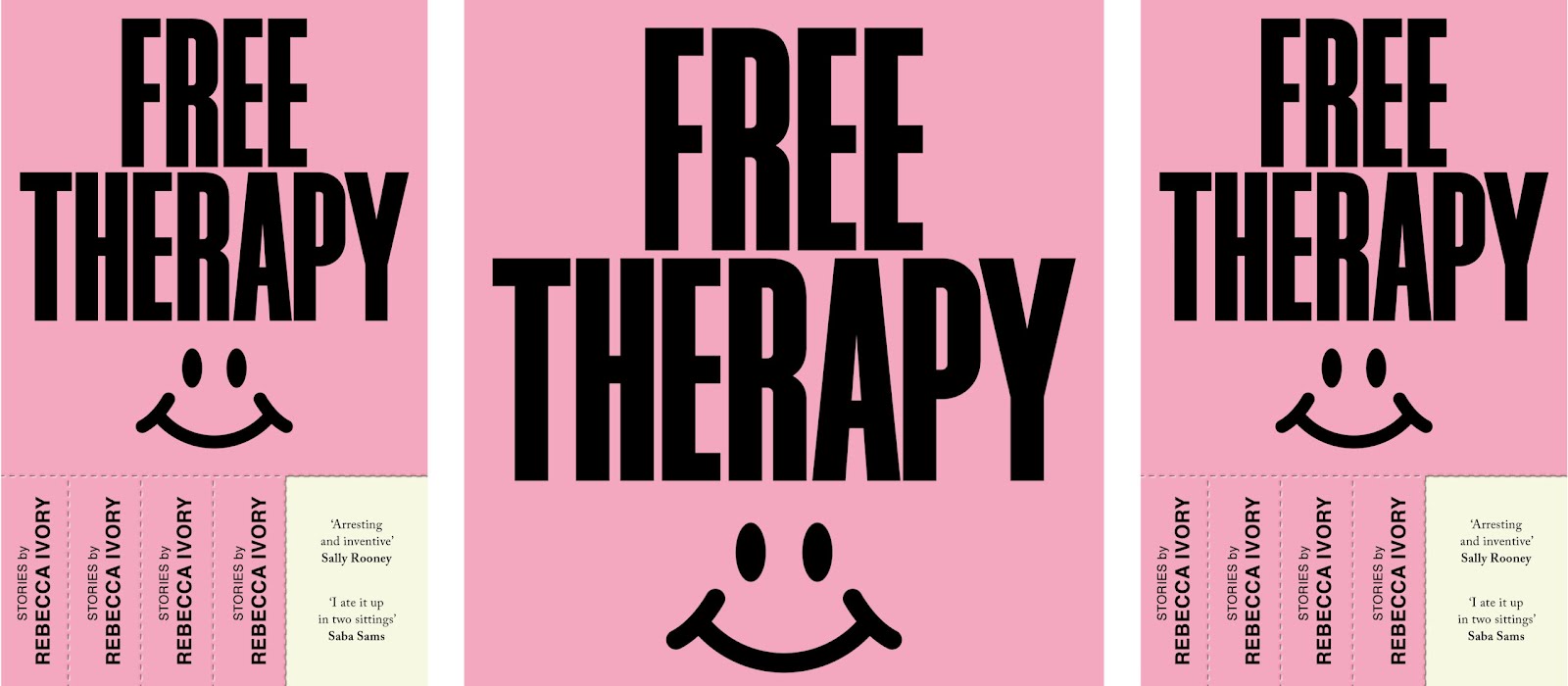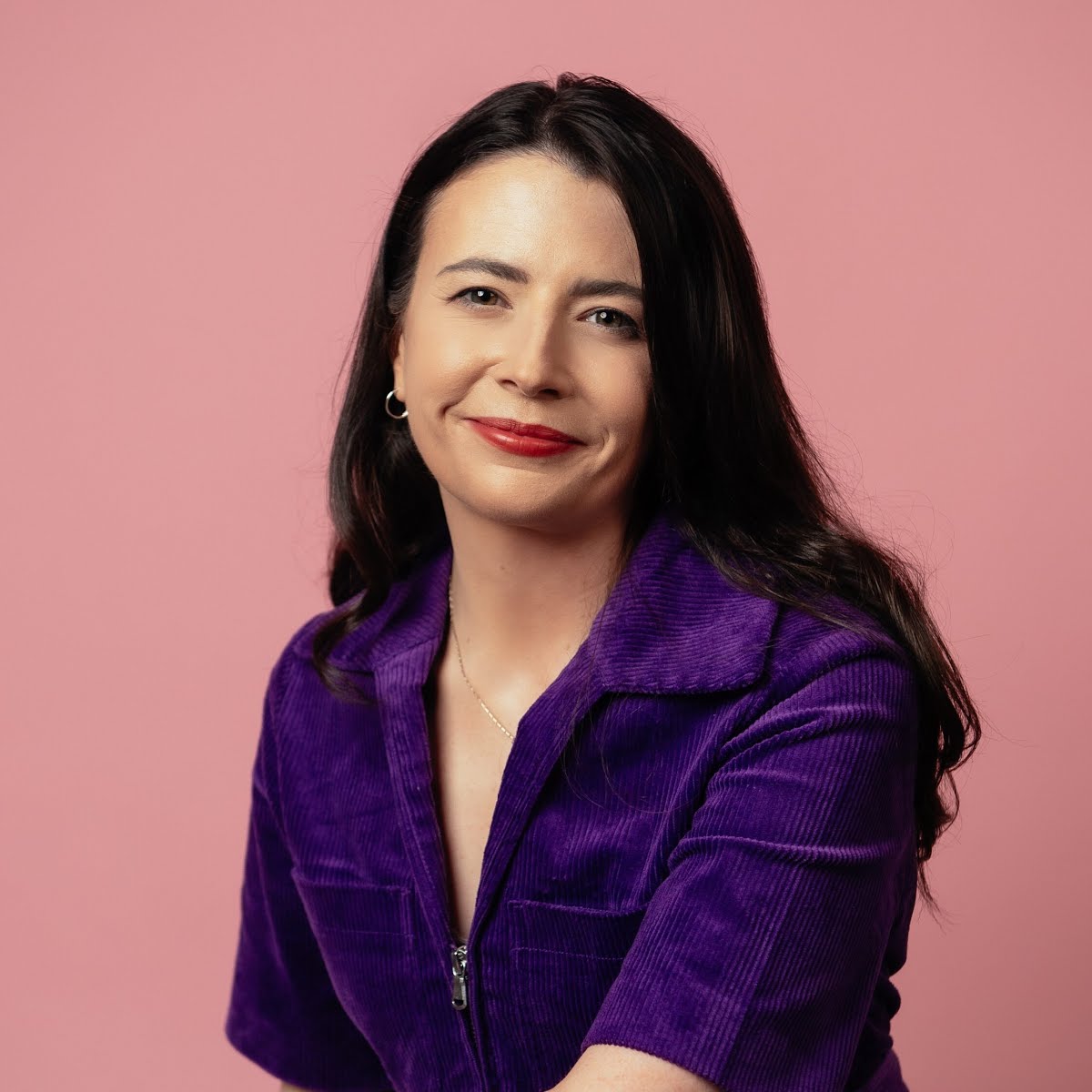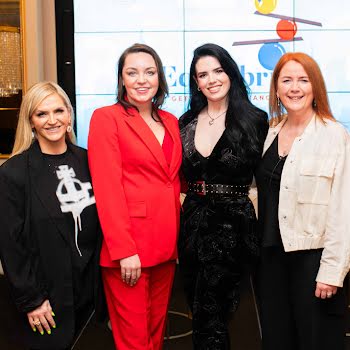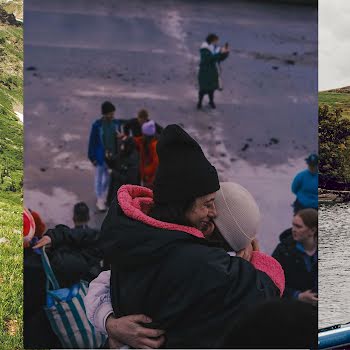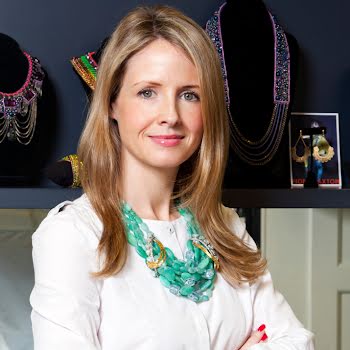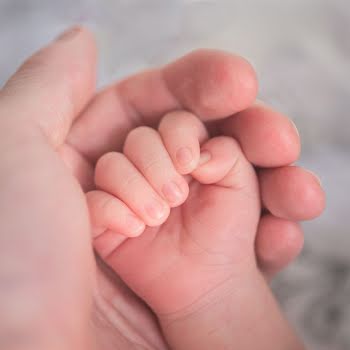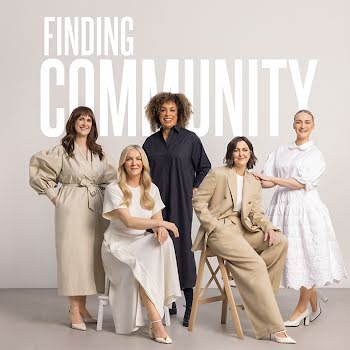
Exclusive short story from Rebecca Ivory’s new book, ‘Free Therapy’
Irish writer Rebecca Ivory shares a story from her anticipated debut story collection, Free Therapy
“Removal”
By Rebecca Ivory
I worry so much about the weather in Alberta. If it continues to snow, I won’t get enough hours at work. I need to get this tooth out but I don’t have the money. The dentist keeps me waiting in the chair. I hear him walking back and forth behind the curtain, talking on the phone, complaining about his taxes. There’s a problem with the price of oil and it’s ruined everything. When he gets around to examining me, he says yes, it’s an infected wisdom tooth. He’ll give me an antibiotic, as a short-term fix.
‘But you’ve already got too many teeth,’ he warns, ‘they’re too big and your mouth is too small.’
He’s digging intently at my molars with a pointed metal instrument, nodding his head forward as he pulls and yanks.
‘That’s why they’re so crooked, see.’ He adds, then, quietly.
The dentist snaps off his rubber gloves, spins away from me in his chair and starts typing up a prescription.
‘How much will it cost?’ I ask.
He grimaces. ‘Does your job offer dental insurance?’
I shake my head no. ‘I work in a restaurant, for now, but it closes after Christmas until the summer.’
‘Yeah,’ he says absently, ‘it’s tough for everybody right now. For one thing, taxes are so high here, what can you do?’
He taps the last few keys and stands to pull the curtain aside for me.
‘I don’t discuss payment with patients. You can do that with the girls out front.’
The examination costs one hundred and ten dollars and the antibiotics cost twenty. It’s going to cost me about five hundred to get the tooth out so every time it starts to throb, I’ll just have to sit very still and wait for it to pass.
I’m working the door with the other host, Charlene. It’s a Christmas party for an oil extraction company. The restaurant is boat-themed, the furniture made out of beat-up, broken-down canoes and there are models of whole fish mounted on the walls. All I’m allowed to do is take coats and pour water. A few years ago, I’d have resented such limited responsibility, as if I was too smart for it. Now, I’ve adjusted to this kind of work. I’ve been doing it, in different places, over the course of ten years. I find myself nervous when I’m asked to carry wine or write the specials on the chalkboard. Often, I forget to grip the stem, or I have to rewrite the specials over and over because my handwriting is too small and crooked.
Unlike me, Charlene is a local girl. She’s lived here all her life. We’re both tall and blonde but she has a better face. She wears plain and subtly sophisticated clothes. I try to recreate her block colours and manly brogues, but I end up looking religious. The oil men flirt with Charlene, as they lay their heavy winter coats into our open arms. They mostly ignore me and because of this, I give them nothing but bland smiles. When I have to look at one of them, I focus on whatever is slightly above their heads.
Charlene dumps her pile of heavy, wool coats on top of the ones I’m already holding in my arms. ‘Each one needs its own number tag,’ she says, poking the pile with her finger. ‘You can do that, right?’
I hurry off to the cloak room. Some of the coats slip from my arms and trail along the floor. Charlene watches me and shakes her head, despairingly.
There are a lot of wives here too. I circle around the first table, offering still or sparkling, again and again, like I’m rehearsing my one line in a play. I lean in to adjust the position of one lady’s glass and she cranes her neck up to scowl at me. She’s old and her face is trembling.
‘You touched the rim of my glass,’ she complains, tapping it with a crooked finger. ‘It’s smudged. That happens to be where I put my mouth, you know.’
Her voice is weak and the room is echoing with chatter. No one else has heard her so I just tilt my face in an expression of pleasant interest, as if she has told me about an accomplished grandchild or a recent trip to Europe. Her mouth gapes momentarily and she touches her husband’s wrist. He’s turned away from her, speaking to another woman. I cross the table, moving on before she can repeat herself.
As I walk away, I see that John the bartender has been watching me, smirking. He is Charlene’s boyfriend. He’s a twenty-year-old who came here for the summer and decided to stick around. So far, after six months here, he is my closest friend. He probably wouldn’t spend time with me if he weren’t an outsider, too. I’m sure in his real life, he wouldn’t have any reason to be friends with a twenty-nine-year-old woman. I’m sure he wouldn’t spend his Friday nights sitting on my bunk bed at the cheap university accommodation I rent where I am also the only person who isn’t in college.
Mostly, it’s innocent. All we ever do is kiss and hold hands while watching movies on my laptop. I like to play movies he hasn’t seen before, like American Werewolf in London or Full Metal Jacket, just to see his reaction. I always pick, he never has any good ideas. I only want to kiss him, nothing more than that. It’s not just that I know he’s already having sex with Charlene. He is so beautiful to me that to do anything other than kiss would feel like a violation. I never imagined being with someone this physically attractive. It’s not something I had ever experienced before and I know that he is beautiful in a way that I am not. But isn’t it true that I had imagined life might start once I came here? So much of it is going wrong: where I live, the money, sneaking around. I’d imagined romance, not like this but this is how it’s happening, this is the way I am living.
He can be immature, though, a little too dramatic. He says he has a sick sister who he sends money to every week but I don’t believe him, he works even less than I do. The sister’s disease is chronic but vague, her diagnoses changing and accumulating. He says it’s a private burden, that I can’t tell anyone but every time I turn a corner at work, I see him with his head hung low, sadly explaining his situation to anyone who will listen. That’s one thing I don’t like about him, he lacks discretion and I can tell he rehearses his stories.
At the end of October, we have an argument on the train. A homeless man in a thin shirt with missing buttons approaches and asks if he can sing to us. John ignores him, I smile politely and shake my head. The man lingers, offended by our disinterest. I give him twenty dollars, the tip money from my shift earlier that day.
‘It’s okay, you don’t need to sing,’ I smile at him.
He accepts the money but it doesn’t help, we have still hurt his feelings by refusing his services. He turns away, his face glum.
When we get off the train, John scolds me for giving away money I don’t have. ‘You’re poor too,’ he says.
‘I’m not poor,’ I say.
‘You should be saving your money. It’s stupid to be generous when you can’t afford to.’
‘Well, you give away your money,’ I shrug.
‘That’s different. That’s family. And I have another job lined up. You haven’t even been looking for work,’ he says.
‘Yes, I have,’ I insist, ‘all the restaurants are closing.’
He is quiet for a moment.
‘Why don’t you apply for something else, something a little more permanent?’ He asks. ‘Office work, a receptionist job.’
‘I have,’ I say quietly.
I don’t tell him that I’ve submitted my CV to a recruitment agency but most places want someone with more experience.
‘It’s just, you’re old enough to want something a little more reliable,’ he says. ‘I look at some of the servers at work who are older than you and it looks tough, they look tired. It’s not always easy going on welfare for the whole winter.’
‘I’m not going on welfare,’ I snap. ‘I can’t anyway, I don’t have that kind of visa.’
‘Well, someone will give you a chance. It’s better to have a degree but you could just lie. You’re not from here, they won’t know,’ he says, cheerfully, trying to turn things around.
I sigh and look at my feet, wet with snow. I regret telling him I left college in my second year. I couldn’t cope with the theory and the rhetoric. I was numb with stupidity. I’ve had lots of jobs since, in barbershops and off-licenses and supermarkets and hotels, but it’s just been a series of side-steps, for the last ten years. I had planned for better opportunities, here. I could do administrative work or be a receptionist. I’m not afraid of hard work, I’m eager to explain. But it doesn’t look good, to have had so many jobs, none of them for more than a year, with all those little gaps, so no one is calling me back.
John usually spends his weekends with Charlene. The weather’s too cold for walking, my hair turns white if I’m out there for more than a minute so I’m often bored, if I’m not working. People warned me of the cold before coming here but I suspected they were exaggerating. Possibly, I also incorrectly categorised myself as intrepid and immune to harsh conditions. If you told me last year that I’d spend much of my free time dithering over whether I should or shouldn’t masturbate when I really ought to be doing something more productive, I wouldn’t have moved here. Although, I probably wouldn’t have believed that this was what lay ahead in the first place, despite this being an apt characterisation of my behaviour so far.
On my days off, I usually end up calling my mother. We talk for a full hour sometimes, unless her husband is there. In that case, she’s cheerful and vague, as if she’s being held hostage. When I call her at the end of November, she’s alone. She is enduring her latest period of sobriety, the third month of it after crashing her car in September. The last time I was at her house, I found dozens of empty cough syrup bottles in the hot press, lined up between the towels. It’s always something, with her.
She asks me about the job situation and I am honest with her, pacing the carpet of my room.
‘You’ll be okay. You’re like me, clever. And you’re not afraid to do the work no one else wants to,’ she says, surprising me.
I feel like saying, we’re not clever, look at our lives. I feel like saying horrible things about myself now, just to hurt her, to make her feel like she has failed. I don’t though, because we’re too far away from each other to be having those old fights again. This time, we have no way of getting to each other, so that we can apologise and cry into each other’s necks. I have to be able to live with what I say to her, from this distance.
‘We have a problem,’ John tells me in the middle of December. ‘Charlene’s friend lives in the same building as you. She’s seen us together, a lot. She told me that if I don’t tell Charlene what’s going on, she will.’
I’m sitting on the bed. He’s leaning against the windowsill.
‘I’m going to have to tell her,’ he says, shaking his head.
‘Why would you do that?’ I object. ‘There’s nothing to show we’ve done anything wrong.’
‘Come on, she’s not stupid,’ he says, impatiently. ‘Why else would we hang out?’
‘We’ll just say that we’re friends,’ I insist.
‘Why would we be friends?’ he asks.
‘I don’t know, actually,’ I shrug. It hurts me but it is an honest question. It doesn’t seem to dawn on him that I might find this upsetting.
‘Just out of curiosity,’ I begin, ‘if you had to choose between us, would you ever choose me?’
I do not look at him as he answers. I focus on a spot right above his head, a patch of dense and grey cloud through the window outside.
Later that week, I am back in work, doing a dinner shift. John has agreed to wait until the restaurant closes before he talks to Charlene so I am not especially uneasy. It’s a slow night so I spend most of my time in the back, by the stairwell, polishing cutlery. I’m dipping the silver in the chrome buckets, filled with hot water, and wiping it off with a napkin. I hear someone approach, their footfall quick and heavy. Charlene stands very close to me. She grips the edge of the bucket with one hand and places the other on her hip. She exhales, noisily and presses her lips together. I realise with a start that she already knows. I care more than I had expected to.
‘Charlene –’
She cuts me off by rattling the bucket of cutlery, hard. It doesn’t topple but some water slops over the edge.
‘Find your own fucking boyfriend,’ she hisses, quietly.
Later, I call John. ‘Well, thanks for waiting,’ I say.
‘It wasn’t me, I promise,’ he insists. He sounds defeated and anxious. I can’t help but feel sorry for him. I know how it feels, to be that age, to have pushed a door you should have pulled. ‘Her friend went and told her anyway,’ he said, ‘even though she said she wouldn’t.’
My last shift is New Year’s Eve. Charlene no longer works here. It turns out she found a new job even before she found out about me and John. The other girls here ignore me out of loyalty to Charlene. They rarely spoke to me anyway so the fact that I feel so hurt and self-conscious is a surprise. The atmosphere is festive, the people growing noisier, more expressive the more they drink. There’s a staff party scheduled for later on, once all the customers leave. My manager has invited me but no one else has mentioned it. It’s supposed to be a celebration, a reward for our hard work this season but the idea of a party makes me feel lonely, especially because I know that after tonight, I won’t have a job. I won’t even see John, who has been avoiding me.
There are other women in my job who I could have made friends with. I could have integrated myself with them, joined them for weekend hikes. I snubbed them, making sweeping assumptions based on petty assessments. They talked a lot about lip filler and eyelash extensions so I judged them to be the kind of women who got sucked into pyramid schemes and didn’t believe in reproductive rights. These were stories I had made up in my own mind, without any proof. I silently mocked them, while eavesdropping in on their earnest expressions of desire for a better life, one in which they made more money and had the kind of partner who shared their dreams and saw their value. I mocked them, in my own mind and to John and my mother and then convinced myself that they were the ones to snub me.
At almost nine o’clock, I hear the heavy front door swing open and slam shut. I turn to see a man wavering on his feet, clearly drunk. He looks to be in his seventies but his hair is long and dyed blonde. As he approaches, I can tell he isn’t about to order any food. Still, I offer him a menu. He laughs at my extended hand and then seems disappointed that I’m frightened. He’s wearing a bomber-style jacket zipped up to his sternum with no shirt underneath it. His bare chest is orange and I imagine he must do sun beds to achieve this colour. I can tell he was muscular, up until a point. His skin appears thick, like his organs are buried a foot deep inside.
After a moment or two, I realise it’s not his deflated form that makes me sad but the fact that he’s wearing women’s reading glasses. They’re the cheap ones that are sold in pharmacies beside hair clips and nail scissors. My mother owns several pairs. I find myself wondering if he simply could not afford a visit to the optician, or if he just likes the look of the purple framed ones he’s now wearing and decided to treat himself. It is the latter possibility that stirs in me a tender feeling. My eyes linger on his frost-bitten hands which are missing several fingers, which he notices. I avert my gaze, trying to redirect us to the appropriate course of action. I ask would he like to sit at the bar or at a table, again sensing that there is something unpredictable and uncooperative happening between us. He sneers at me like he can see every dirty, cruel thing I’ve ever done in my life, like he recognises my pity as being false and condescending. I don’t want anything to do with him and he knows it.
He turns away from me and looks around, clutching his belt buckle. Diners bristle as he walks past them on his way to the bar. My manager approaches him and asks if he’d like something to eat. She doesn’t want him here but speaks to him as though she’d love nothing more than for him to stay. He tells her he has no money and she offers bread and coffee, instead. He doesn’t like this and asks for a drink, louder this time. My manager says she cannot give him the drink and suggests he go home to have a rest. He pushes past her in a temper and on his way out, deliberately and swiftly tips over a diner’s bowl of split pea and sausage soup. The diner holds his spoon mid-air and stares at the green liquid and chunks of meat splattered across his lap in disgust.
By the end of January, it has been four weeks since I’ve gotten a payslip. I thought I’d be able to stretch things out but I was wrong. I am so broke that all I can afford are tomatoes and bread. I’m flushing my mouth with salt water every night, to ward off a chronic but low-level tooth infection. My mother worries I will get sepsis. I send her a text, asking if she could loan me money to get the tooth out. She replies immediately, asking if I can wait another two weeks. She includes in her text a list of her own bills and her current funds. She also follows up with a text to say it is a shame that it hasn’t panned out for me, as I had hoped. I can picture her saying this to her husband, telling him that I’ve always been this way, allowing money to fall between my fingers. I want to reply and say, tell me again how we’re clever. Tell me again how we’re hard-working. What about us would suggest these qualities?
In the first week of February, I cut through the park to get home from the supermarket, carrying a paper bag containing tomatoes, bread, eggs, and off-brand Corsodyl. Over by the pond, I see the man from the restaurant. I recognise him immediately, from his hair and his build. He is stumbling along the water’s edge. An elderly couple pass by and he trails along after them, probably asking for money. When they ignore him, he clutches at his jacket and doubles over, in anguish. The fact that he is completely silent while doing so makes it appear more dramatic. He stumbles forward again, still bent over like that.
I only observe him briefly before moving on, I don’t want him to notice me. I’m embarrassed to remember back to October, when I had money to give to the homeless man on the train, the one who wanted to sing for me. John had been right, it was irresponsible, giving it away like that. I do let money slip through my fingers, it was easier and cheaper to give it away for nothing than to say, no, I don’t want to hear you sing. I’d prefer to be stumbling through dull and poorly paid jobs than feel the inadequacy and stupidity that might come from pursuing a stable, promising career that most people can do without it proving too difficult. Anything to avoid humiliation, however minor, or conditions that might require resilience. I still hope that I’ll see John again, even though he doesn’t want to be with me, not in the way I want him to. And I’d rather avoid the frightening man in the park in case he tries to talk to me, not because I find him revolting but because how can I say no to him? I’d end up pretending that I’d love to chat, to walk together, only to cruelly slip away once he’d turned his back to point to the geese or tie his shoelaces, just as he started to feel like I reminded him of someone else.
That night, I wake up with a shooting pain in my jaw. When I go to the bathroom to rinse my mouth with the salt water, I look in the mirror and see that my face is swollen and purple, as if I am concealing a golf ball between my cheek and teeth. My mouth is too painful to pry open and look inside, the salt water dribbles back out, down the sink.
I try to lie back down and go to sleep but now that I’m awake, the throbbing is relentless and I’m frightened by the swelling. I know I need to go to the hospital; the pain is too urgent. This isn’t the problem, though. While dental care is still expensive, Canadian hospital visits are free. The problem is the snow, it’s heavy and I can hardly see out my window. It’s not far but I’m not sure I could stand the cold for longer than a few minutes. I decide to call John, the only person I know well enough to ask for help at three in the morning. I message first, to ask if he’s awake. After ten minutes, he has not responded so I call him. It rings out. A taxi will cost me between fifteen and twenty dollars and I’ll probably end up needing to buy some medicine and how much will that cost? Despite knowing this is not money I can afford to spend, I decide there’s nothing I can do about it, so I order a taxi on my phone. Within twenty minutes, I am at the emergency department.
The wait time is less than an hour and the receptionist and triage nurse are both pleasant and efficient. Their cheerful sympathy has a calming effect and even though my mouth still throbs, the pain is bearable in this environment. The nurse, who looks younger than me, leaves me to wait in a small room on a bed covered by a paper sheet. Shortly after, the doctor arrives. I had expected someone tired and disinterested but he is kind and patient, squeezing my ankle to reassure me.
After peering inside my mouth, he tells me the tooth is impacted and badly infected. ‘How long have you had this problem?’ he asks.
‘Since late September, on and off, I think.’ Even as I say it, I feel a rush of shame that I have not managed to get it removed in all this time.
‘September?’ he repeats, incredulously.
Noticing my embarrassment, he squeezes my ankle once more. ‘It’s okay, I’m not scolding you, I’m just amazed we’re only seeing you now. You have to be very careful with dental problems, particularly impacted teeth,’ he explains, waving a hand around his face. ‘People only think about teeth when they want a pretty smile. But if you had left this any longer and the infection spread, you could have ended up with a brain injury.’
‘But you’re here now,’ he continues, ‘and we can give you some strong antibiotics, some steroids and some codeine.
But be careful with the codeine. Only take that when you need it.’
I nod. ‘And what about the tooth?’ I ask. ‘Can you take it out?’
He shakes his head. ‘No, it’s too infected. You’ll have to wait until it’s healed. Even then, you will need a dental surgeon.’
I am home a little after six in the morning. My phone died on the way back and when I charge it, I see two messages arrive from John. The first says he didn’t see my calls or texts, that he was asleep. The second is a longer message, telling me that he doesn’t think we should be in contact anymore, that we can’t be friends because he’s trying to make it work with Charlene. He wishes me a lot of luck and hopes that I understand. I don’t even finish the message, I put down my phone. He watches too much TV, I say to myself, thinks everything is a big deal. But even after I nap and take some codeine, the messages still bother me, like little stones in my shoe.
In late February, I get a receptionist job at a recruitment agency, of all places. They have no problem telling me that my predecessor left because she couldn’t handle the bull pen. I think they must have no lives outside the office, if this is how they talk. They need me to start right away and I do. I fill out the employee forms carefully and triple-check my bank details. By the time they pay me, I have eight dollars and thirty-two cents left.
The young female recruiters ignore me. They are cruel to prospective candidates who don’t measure up. As soon as they’re finished on the phone, they start talking about how desperate the candidates are, how unskilled. The young men aren’t burdened with the same insecurities. The older men lean over my desk to chat but don’t invite me to lunch or after-work drinks because that type of thing isn’t allowed any more. Sometimes they say inappropriate things and I know I’m not supposed to feel sorry for them but I do because all these new rules must be confusing.
In March, I finally get the tooth out. In the meantime, I get another infection but it’s not so bad this time, I get by with the rest of the codeine from the hospital. The removal costs me five hundred dollars, which is still a lot of money to me but it doesn’t break me, I can still afford groceries and I only have to take three days off work. I go back to the same dentist I went to in September and he still complains about his taxes, while he yanks the rotten tooth out of my head. Afterwards, I feel superstitious about throwing it away, as though keeping it close to my body might ward off future adversity and pain. I ask him if I can keep it but when he shows it to me, it is tiny and grey and when he squeezes it, it crumbles between his fingers.
A few weeks later, I find a new place to live. It’s a little more expensive but I can’t keep living in the dormitories. I move into a ground-floor apartment which I share with an Italian girl who doesn’t speak a lot of English. We communicate through hand gestures and play Jenga together. Sometimes I think it’s probably better that we can’t have a real conversation because at least we can’t be unkind to each other.
The weather improves in April and I buy a beautiful blue bicycle from an English woman who lives eight blocks away. She tells me it takes at least two years to get used to everything, that when she first arrived, she lived in a hostel for several months and had to work three restaurant jobs just to get enough hours. I try not to linger too long because I can see she has her children to get back to. It’s the first bike that I’ve owned as an adult. In the advertisement, it cost one-hundred-and-fifty dollars but when I try to give her the money, she won’t take more than ninety.
I won’t be able to use it in the winter, but I like the idea of being a young woman who cycles through the city on a nice bike. I like to think about what the men who see me cycle might assume about the other parts of my life. It occurs to me that I might be lonely but I don’t consider it a priority. It’s only when I’m two blocks away from the woman’s house, cycling up the first steep hill, that I realise there are no gears: the bike is a single speed, designed for leisurely cycles over flat land. I feel stupid and self-conscious and stand up to put all my weight on the pedals but it’s hard, I’m very out of shape. At the top, I reach a group of old men hanging around outside a café, smoking. I am breathless and sweating from the climb and the new heat. As I roll by, I hear them laugh, clap and whistle behind me.
Extracted from Free Therapy by Rebecca Ivory (Jonathan Cape, approx €20), out now.
ABOUT REBECCA IVORY
Rebecca Ivory was born in 1993 and is a writer based in Dublin. Her short fiction has appeared in The Stinging Fly, Banshee, Tangerine and Fallow Media. In 2020, she was awarded a Literature Bursary from the Arts Council of Ireland. Free Therapy is her debut.
Photograph by Ruth Medjber











